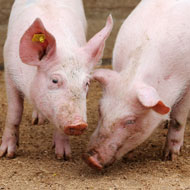
Usage must be reduced to avoid endemic disease
Research by Dr Georgia Crayford, senior policy advisor at the National Pig Association (NPA), has concluded that pig farms must reduce the need for antibiotics if we are to avoid drug-resistant diseases.
Speaking at the Nuffield Conference in Glasgow last month, Crayford explained how antibiotic use has led to a multitude of disease challenges being masked. Crayford concluded: “This has resulted in a lack of focus and resource being directed towards effective disease prevention.”
Crayford went on to explain how the focus should not be “zero use of antibiotics in pig production,” but instead to, “reduce the need”.
Behaviour change in pig farmers, specifically in improved infection prevention through industry-led initiatives, was highlighted as a method for tackling the issue.
“Framing the problem in a different, more personal way can help farmers to understand why tackling antibiotic resistance should be made a priority,” stated Crayford.
Conclusions warned that failure to address overuse of antibiotics may result in endemic disease to which antibiotic treatment is no longer a successful option. Crayford urged pig farmers to consider the true cost of antibiotic medication.
Writing on its website, The Agriculture & Horticulture Development Board Pork (ADHB) commented that the topic has never been more important than it is today.
The full presentation of the research can be viewed here.



 The veterinary mental health charity Vetlife is inviting the veterinary community to join it for a sponsored cold-water dip.
The veterinary mental health charity Vetlife is inviting the veterinary community to join it for a sponsored cold-water dip.